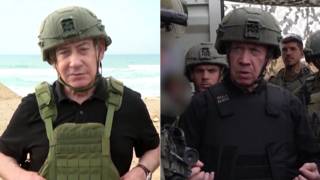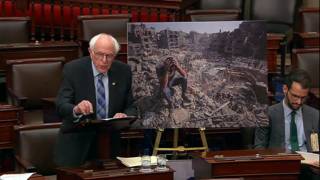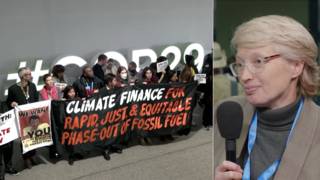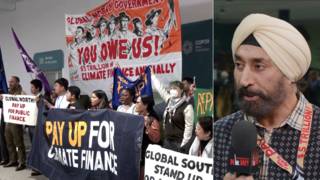HeadlinesMay 30, 2019
Robert Mueller Says His Report Did Not Exonerate President Trump
Special counsel Robert Mueller on Wednesday broke more than two years of silence over his investigation into Russian influence in the 2016 election, contradicting Attorney General Bill Barr’s claims of Trump’s “total exoneration” and saying he could not state that the president is innocent of a crime—namely obstruction of justice. Mueller’s remarks came during a surprise appearance at the Justice Department, where he announced he had wrapped up his work and was resigning as special counsel. Mueller repeated his finding that there was insufficient evidence to charge Trump and his campaign with a broader conspiracy with Russia, but he pointedly contradicted Attorney General Barr’s assertion Mueller had concluded Trump was innocent of obstruction of Justice.
Robert Mueller: “A president cannot be charged with a federal crime while he is in office. That is unconstitutional. Even if the charge is kept under seal and hidden from public view, that, too, is prohibited. The Special Counsel’s Office is part of the Department of Justice, and, by regulation, it was bound by that department policy. Charging the president with a crime was therefore not an option we could consider. … If we had had confidence that the president clearly did not commit a crime, we would have said so. We did not, however, make a determination as to whether the president did commit a crime.”
Mueller’s Public Remarks Stoke Calls for Trump’s Impeachment
Mueller’s public remarks prompted fresh calls for impeachment proceedings against the president. This is House Judiciary Chair Jerrold Nadler.
Rep. Jerrold Nadler: “With respect to the impeachment question, at this point all options are on the table, and nothing should be ruled out.”
Eight Democrats vying for the 2020 presidential nomination are now calling for the House to open impeachment proceedings. Cory Booker, Kirsten Gillibrand and Pete Buttigieg joined the call for the first time on Wednesday. They join Senators Kamala Harris and Elizabeth Warren, Congressmember Seth Moulton, former Congressmember Beto O’Rourke and former HUD Secretary Julián Castro. Meanwhile, Senator Bernie Sanders said Wednesday he would support the House Judiciary Committee if it opens impeachment proceedings.
Israeli Knesset Dissolved as PM Netanyahu Fails to Form Ruling Coalition
In Israel, new elections have been called after Prime Minister Benjamin Netanyahu failed to form a coalition government after six weeks of negotiations following the April 9 election. The news comes as the United States is promoting a controversial Middle East peace plan drawn up by President Trump’s son-in-law Jared Kushner. Kushner is in Israel today along with special envoy Jason Greenblatt, but the Israeli newspaper Haaretz reports the political crisis in Israel could kill the U.S. plan. The U.S. has scheduled a conference in Bahrain next month to unveil part of the plan. Palestinian officials have already vowed to boycott the conference and have dismissed any attempts to tackle peace talks in the region without addressing human rights and the Israeli occupation. We’ll have more on Israeli politics and Jared Kushner’s so-called deal of the century after headlines with Palestinian diplomat Hanan Ashrawi in Ramallah.
Without Evidence, John Bolton Blames Iran for Oil Tanker Sabotage
President Trump’s national security adviser on Wednesday blamed Iran for mines that damaged oil tankers in the Persian Gulf this month, as well as a recent drone attack on a Saudi oil pipeline. Speaking to reporters in the United Arab Emirates, John Bolton offered no evidence of Iranian involvement, instead asking, “Who else would you think is doing it? Somebody from Nepal?” Bolton also said Iran had “no reason” to walk away from the Iran nuclear deal—his comments coming exactly a year after the U.S. did exactly that. This comes as the U.S. deployed an additional 900 troops to Saudi Arabia and Qatar.
Louisiana Lawmakers Approve Ban on Most Abortions
In Louisiana, lawmakers approved a bill Wednesday that would ban abortions once a fetal heartbeat can be detected, becoming the latest state to challenge the Supreme Court’s landmark 1973 ruling, Roe v. Wade. Louisiana House lawmakers voted 79 to 23 for the bill, which outlaws abortions as early as six weeks into a pregnancy, while providing no exemptions to people who become pregnant by rape or incest. The state’s Democratic governor, John Bel Edwards, has promised to sign the bill into law.
Disney May Halt Filming in Georgia If State Abortion Ban Takes Effect
Walt Disney’s Chief Executive Officer Robert Iger said Wednesday his company was prepared to halt filming in the state of Georgia—a major hub for film and television production—if a recently passed ban on most abortions takes effect.
Robert Iger: “I think it’s also likely to be challenged in the courts, and that could delay it. And we’re being careful and cautious about it. But if it becomes law, I don’t see how it’s practical for us to continue to shoot there.”
Disney’s threat to boycott Georgia over its anti-choice law follows a similar move by Netflix earlier this week.
Latin American Rape Survivors Who Were Denied Abortions Appeal to U.N.
In Geneva, Switzerland, four young women from Latin America who were raped as children and denied abortions brought lawsuits Wednesday against their governments before the U.N. Human Rights Committee. The women, who are now between 18 and 23 years old, were 14 or younger when they were raped in Nicaragua, Ecuador and Guatemala. All four dropped out of school after discovering they were pregnant, and their rapists were never brought to justice.
Argentines Hold One-Day Strike Against IMF-Imposed Austerity
In Argentina, a nationwide general strike against government austerity measures brought much of the South American nation to a standstill Wednesday. Argentina’s unions called the 24-hour strike to protest against high inflation and deep cuts to social welfare benefits, in exchange for a $56 billion loan from the International Monetary Fund.
Argentine Lawmakers Consider Bill to Decriminalize Abortion
Wednesday’s strike came one day after protesters gathered at the National Congress building in Buenos Aires in support of new legislation to decriminalize abortion. This is Argentine high school student Abril González.
Abril González: “The only thing I’m hoping for is that legislators vote well and with their consciences this time, that they think of the lives of the girls that have died from secret abortions in subhuman conditions and that they let legalization become law.”
Honduran Protesters Mobilize Against Privatization Plans
In Honduras, tens of thousands of protesters joined striking educators in the streets of the capital Tegucigalpa and other major cities in recent days, protesting plans by President Juan Orlando Hernández’s government to privatize healthcare, pensions and education. The reforms would also expedite budget cuts and ignite mass layoffs. The government said Tuesday it would enforce sanctions and criminal charges against teachers and medical personnel involved in any of the demonstrations. Dozens of protesters were injured Monday as roadblocks and other mobilizations throughout the country were met with tear gas and violent repression from the Honduran police and military.
U.S. Battered by Extreme Weather, with 500+ Tornadoes in 30 Days
In the Central U.S., officials in seven states issued tornado warnings on Wednesday, making it the 14th straight day of severe weather that’s shattered previous records for the month of May. In just the last week alone, tornadoes have been linked to at least seven deaths and scores of injuries. Over the past 30 days, meteorologists have logged more than 500 tornadoes across the U.S.—a record total that’s consistent with models predicting more extreme weather due to climate change.
Energy Department Attempts to Rebrand Methane as “Freedom Gas”
The Trump administration has branded methane—a major source of greenhouse gas emissions driving the global climate crisis—as “freedom gas.” The rebranding came as part of a Department of Energy news release on Tuesday, hailing increased exports from the Freeport liquified natural gas terminal in Texas. U.S. Under Secretary of Energy Mark Menezes said of the project, “Increasing export capacity from the Freeport LNG project is critical to spreading freedom gas throughout the world.” He was joined by Assistant Secretary for Fossil Energy Steven Winberg, who said, “I am pleased that the Department of Energy is doing what it can to promote an efficient regulatory system that allows for molecules of U.S. freedom to be exported to the world.”
WikiLeaks Says Health of Jailed Founder Julian Assange Is “Deteriorating”
WikiLeaks is warning that its founder, Julian Assange, is in deteriorating health and has dramatically lost weight since he was jailed last month in London’s Belmarsh Prison. In a statement, WikiLeaks said Assange had been transferred to the prison’s health ward, and his lawyer Per Samuelson told reporters, “Assange’s health situation on Friday was such that it was not possible to conduct a normal conversation with him.” Assange was due to appear by video link before a magistrates’ court today but failed to appear, reportedly due to health problems. The Trump administration is seeking Assange’s extradition to the U.S. to face 17 counts of violating the World War I-era Espionage Act—which could see Assange jailed for 170 years. Press freedom advocates have denounced the charges as a direct assault on the First Amendment aimed at chilling investigative reporting.
Joe Biden Puts Hands on Shoulders of 10-Year-Old Girl, Saying “You’re Good-Looking”
Former Vice President Joe Biden is facing a backlash on social media over his comments to—and physical contact with—a young girl at a campaign event in Houston, Texas. On Tuesday, Biden joined a town hall meeting held by the American Federation of Teachers, where he promoted his education plan—the first major policy announcement of his 2020 presidential campaign. Asked by a 10-year-old about political divisions within the United States, Biden concluded his answer with this exchange.
Joe Biden: “I’ll tell you what, honey, what I’m going to do, if you give me an address, I’m going to write you a longer answer and tell you the exact things I would do, OK? OK? Promise? I’ll bet you’re as bright as you’re good-looking. I tell ya.”
Joe Biden then put both hands on the girl’s shoulders and marched her over to assembled reporters, at one point leaning in close to her head. Last month, Biden said he would be more mindful of people’s personal space, after two women stepped forward to accuse him of inappropriate touching. Biden has not apologized for the incidents.
Yemeni Journalist Denied Visa to Come to U.S. to Receive Pulitzer Prize
And in New York City, the winners of the 2019 Pulitzer Prize awards gathered for a lunchtime ceremony Tuesday with one conspicuous absence: Yemeni journalist Maad al-Zekri, who was barred from entering the United States to receive his prize after the Trump administration denied him a visa. Al-Zekri was part of an investigative team of Associated Press journalists who uncovered torture at secret prisons run by the United Arab Emirates in southern Yemen. In a statement, the Associated Press said it was “terribly disappointed” that al-Zekri was unable to attend the ceremony. Yemen is one of six majority-Muslim countries whose citizens were barred from entering the U.S. under an executive order signed by Trump and upheld by the Supreme Court in a 5-4 ruling.
Most popular
- 1
- 2
- 3
- 4
Non-commercial news needs your support
Please do your part today.











Media Options